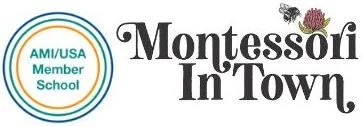What ages are the children at MIT?
Montessori In Town serves children as young as 18 months through 6th grade.
While we can take children as young as 18 months, they must be very stable on their feet, able to sit up in a chair independently, and able to carry objects while walking.
Are you open year round?
Our calendar aligns (for the most part) with Atlanta Public Schools. We are closed for Thanksgiving week, two weeks in winter, and one in spring. We offer Summer Camp for our Primary program and a Summer Session for our Toddler program. The school is closed the first week of Summer, the week of July 4th, and the last week of Summer.
What are your hours?
The Primary and Elementary programs are open from 7:50 am until 3:00 pm, with the option of adding aftercare (until 5:30 pm) for an additional fee.
The toddler program is open 8:15 am until 3:00 pm or 5:30 pm, depending on which class a child is in.
Can you provide financial aid?
All Primary & Elementary applicants are welcome to apply for financial aid between November 1st and February 8th for the upcoming school year. Financial aid for the current school year has already been awarded.
Financial need is assessed by a third party. MIT is then able to assess and award aid accordingly. All applicants are not guaranteed financial aid. Aid will be offered first to current families and is heavily weighted toward students ages 5-12 years old. Financial aid is not available for Toddler program tuition and is very limited for 3-4-year-olds.
Why is a child visit part of the application process?
For the Toddler age group, we invite your child to join your family meeting. We will discuss their developmental growth to ensure the Montessori method will serve their needs.
At the Primary level, we invite your child to enter the classroom with one of the teachers. They will be considering temperament, their independence, and evaluating if the child will be able to thrive in the Primary community.
Elementary applicants are invited to meet with the teacher and may be invited to attend a visit day. The teacher will be looking at academic skills for their age group and assessing the potential ease/difficulty of switching to a Montessori educational method. Ultimately, we want to ensure your child is set up for success.
Spanish, music, art, and physical activity are included in the curriculum during the day. For children aged three and older, we offer various after-school activities that parents may choose to register for with the individual instructor. These have included art class, dance, chess, soccer, singing, ukulele, theatre, and more!
Do you offer enrichment activities?
Are snacks and lunches provided?
Each week, a family is assigned as the “family of the week”. This family purchases food for the classroom that week. The children really enjoy helping select items and participating in the shopping. The school does provide snacks for the afternoon.
Students bring a healthy lunch from home. We see a wide variety of foods brought in!
What method of discipline is used?
The Montessori method of discipline is unique in that it doesn’t offer children rewards and punishments. Instead, children’s intrinsic motivation is fueled by encouragement and they experience natural consequences. If necessary, a child may be asked to take a break or they’ll be redirected to more constructive behavior
All of our lead teachers, who we call “guides”, hold a diploma from the Association Montessori Internationale for their age-level. Assistants come to us with experience working with children and then are trained to assist a Montessori class. All our staff members are trained in CPR and first aid and maintain the required education hours for Bright From the Start or the Georgia Accrediting Commission.
What certification do your teachers hold?
Does my child need to be potty trained?
Children entering the Toddler program will spend lots of time becoming independent in the bathroom. The toddler guides will work with parents to support toilet learning at home. However, children entering our Primary program must be potty trained before they can begin.

